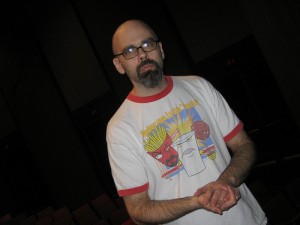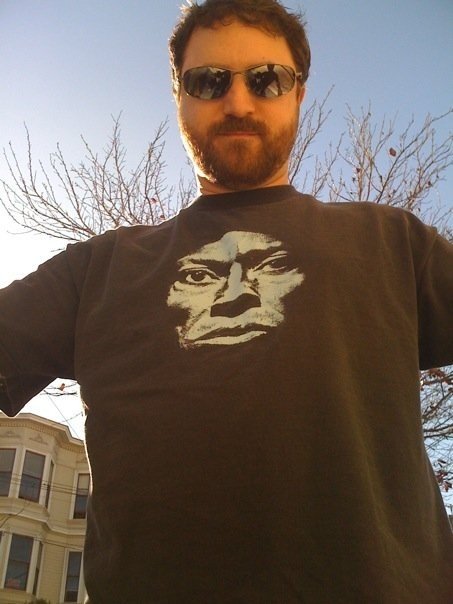 I don’t remember how I first came across Andrew Durkin’s blog, but I remember where it led me. I read his post “Winging It” concerning a review of the band Mostly Other People Do The Killing and the idea of spontaneity. The reviewer turned out to be Peter Hum of the Ottowa Citizen. I immediately became a fan of both men, and have been following their writings and conversing with them on the internets ever since.
I don’t remember how I first came across Andrew Durkin’s blog, but I remember where it led me. I read his post “Winging It” concerning a review of the band Mostly Other People Do The Killing and the idea of spontaneity. The reviewer turned out to be Peter Hum of the Ottowa Citizen. I immediately became a fan of both men, and have been following their writings and conversing with them on the internets ever since.
Andrew is a self-described “hack composer and pseudo-intellectual living in Portland, OR”. I call him a composer/philosopher and delight every time I see a new post from him on either his personal blog Jazz: The Music of Unemployment or the blog of his band The Industrial Jazz Group.
Andrew was the second artist I profiled for “Makin’ it Happen Friday” and you should go read that feature to get an idea of where he is coming from. Then read on to get his take on Twitter and why musicians should be using it.
Why Tweet?
A few months back, I came upon my my one-year anniversary with Twitter. It’s an event that probably only happened because I’m trying to stay on top of all of the tools that are (supposedly) beneficial to indie musicians in this new music economy. (It’s a kind of mania, I know.)
Honestly, for a long time, “tweeting” (it’s still hard for me to type that word without laughing) was kind of an underwhelming experience for me. Especially given the fact that I was simultaneously using Facebook, Twitter seemed more redundant than anything else. After all, Facebook has that embedded status update thing too – plus you get a whole lot of other bells and whistles (perhaps too many, if the backlash against the new design was any indication).
In part, my initial Twitter lassitude was due to the fact that I started using it long before I got into mobile computing. One of the boostery arguments for Twitter is that it can only partly be realized in the context of a laptop. Being mobile is part of the point, at least if you want your “tweeting” to have any sort of “real time” oomph to it. (A laptop is too cumbersome for something? Oh, the irony!)
But even after I “went mobile,” I remained ambivalent for a while. It was not so much the luddite “critique” of this technology that concerned me. Let’s face it: there are legitimate, reasoned arguments that can be made against becoming a twitter-holic. For instance, there’s a qualitative, philosophical difference between live-tweeting your responses to a concert, and simply having those responses. I suspect that if the former ever became the dominant mode of concert-going, music would be in trouble.
But I kept at it, despite these misgivings. Why? Well, for a long time, what was missing for me was a metaphor. That is, a way of understanding what Twitter was about by seeing it through the lens of some other already-familiar experience or practice. (There’s a reason we call ’em webpages.)
And now I finally think I have one: Twitter is a cocktail party conversation – an open, eavesdrop-able, somewhat chaotic, potentially shallow, but potentially powerful, people-watching kind of experience. Unlike Facebook, which is built on the model of re-establishing (and slowly expanding, if you like) your real-life networks – either your current networks or the ones you had years ago – Twitter is an environment where you can more or less go up to a complete stranger with the digital equivalent of a “Hi, how are you doing?” and initiate the sort of small talk that provides the first connection that can then lead to a more meaningful relationship. (There is of course always the possibility for more depth once taken outside of the context of the party.)
And that is pretty cool, especially for someone like me (or any musician), who depends on networking for his career, but who has always been horrible at real-time, face-to-face chit-chat.
I’ll go further: Twitter is the easiest and most effective way I know to tell stories. And, as I have said before, if there’s anything jazz needs right now, it’s a few good stories.
Consider this:
Ariel: […] Let’s move on to Twitter specifically for musicians and some practical things. We’ve kind of now given you an overview of whom Laura is how she ended up in Twittervile. But I think that there is a plague that happens in the music and artistic community. That plague is thinking that the only way to make a community is by exposing people to your music. I see artists make this mistake consistently. They’re so trained to talk about their music and just go up to someone and give them a flyer or whatever, that they forget there’s an entire other side to them.
When I learned about Twitter and I started getting into it, I had to really lobotomize my old “traditional publicist, “ self as the person that was trained in a very specific way: You create buzz by writing a press release and then you release it all over the world via blasts and PR newswires and this type of communication is a one-way conversation. I think this is how a lot of us still perceive “promotion” to this day.
Laura: Right.
Ariel: Old school PR is all about: “I must tell everyone everything in one page and blast it.” What Twitter is about is it’s the antithesis of this approach. It’s actually scorned upon to over-hype or over-market.
[…]
Laura: […] One of the first thing I would say to any musician listening to this, let’s face it, obviously, you don’t only write music and […] only perform music so you can sell it and make money. You do it for emotional connection. You do it for artistic expression. You do it because you want to change something in the world. You do it because you feel a certain way and you want other people to understand how you feel. Right?
All the basic motivating things that drive you to be a musician are the things that are going to make you really good at something like Twitter. Because Twitter isn’t about push, push, push the music.
Obviously, you need the music to sell, to survive and to be able to pour more into your art, but all the things at the center of your art itself, the work you’ve put in, the talent you’ve acquired, the things you know about music, the things you’re trying to figure out in your lyrics or in your performances, all those really soulful things…
This sounds silly when I talk to executives, believe me. But for musicians it’s great because all those soulful things are going to be what makes you successful on Twitter. People want personality. They want authenticity. They want a genuine look at the person behind the music.
In other words, cool: #jazzlives! But let’s hear more about the lives behind the jazz, too. Twitter is a great way to start getting those important narratives out there.




YES — I have only been using twitter for a couple of months now, but your metaphor still resonates.
One thing about music (and, by extension, musicians) is that what we create has a unique way of connecting to people. Our brains are designed to hear music. Music triggers memories, music helps us identify ourselves as members of a community, and music is an important flash point for conversation. That gives musicians a lot of power. In the previous model, most of that power was ceded to record labels. Twitter is one of many tools out there that allow musicians to connect directly with fans — to “build their brand” — which is, of course, GOOD.
{ 1 trackback }